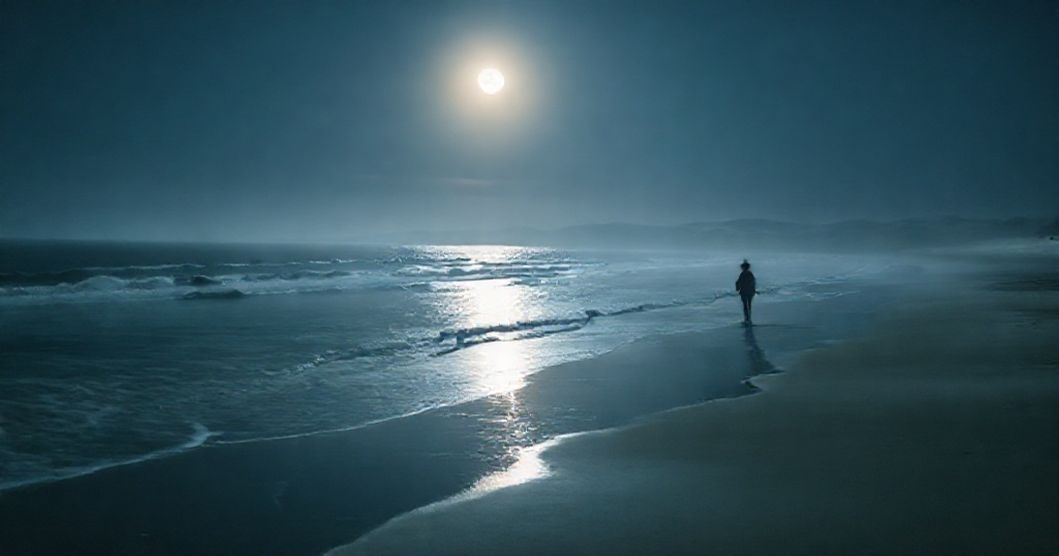Core Symbols: The Beach, Moonlight, and Wandering
The beach itself is a primal symbol of liminality—a threshold between land and water, known in dream psychology as a space where the conscious and unconscious realms intersect. In moonlight, the beach transforms from a daytime haven to a stage for introspection, with the moon’s silver glow acting as a soft, intuitive light rather than the harsh clarity of sunlight. The flickering moonlight introduces a layer of dynamic tension: it’s neither fully illuminating nor entirely shadowed, much like the in-between states of emotion or decision-making. Meanwhile, wandering isn’t aimless; it’s the subconscious’s way of exploring territory that feels both familiar and unknown, suggesting a journey of self-discovery rather than a random stroll.
Moonlight, in particular, carries deep symbolic weight across cultures and psychological frameworks. In Jungian terms, the moon represents the feminine, intuitive aspect of the psyche—the part that processes emotions and hidden truths beneath the surface. When this lunar light flickers, it hints at the unconscious’s tendency to present fragmented insights, not clear answers. The beach, as a space of both comfort and exposure, becomes a metaphor for how we navigate vulnerability: the sand shifts beneath your feet, yet the horizon remains steady, mirroring life’s mix of instability and purpose. Together, these symbols paint a picture of emotional processing in motion, not resolution.
Psychology Lens: The Brain, Emotions, and the Lunar Rhythm
Want a More Personalized Interpretation?
Get your own AI-powered dream analysis tailored specifically to your dream
🔮Try Dream Analysis FreeNeuroscience offers another layer to this dream’s meaning. During REM sleep, the brain’s default mode network activates—an area linked to daydreaming, memory processing, and self-referential thoughts. This explains why wandering in dreams often feels so natural; it’s the brain’s way of rehearsing emotional narratives while we rest. The flickering moonlight might correspond to the brain’s attempt to make sense of recent emotional stimuli: perhaps a relationship shift, a career pivot, or a loss of clarity in daily life. When we dream of the beach, our minds are essentially replaying the “emotional soundtrack” of these experiences, with the moon acting as the conductor.
Freud would likely interpret the beach as a space for repressed emotions to surface, while Jung might frame it as a meeting of the personal and collective unconscious. The beach, a universal symbol across cultures, taps into our shared primal memory of water as a source of life and mystery. The flickering light could represent the tension between what we think we know and what we feel we need to explore. Unlike a fully lit beach, where every detail is clear, the flickering moon forces us to engage with ambiguity—a key theme in modern life, where certainty often feels fleeting.
Life Triggers: When Do These Dreams Arise?
This dream tends to surface during periods of transition or uncertainty. If you’ve recently changed jobs, ended a relationship, or moved to a new city, the beach becomes a stand-in for the unknown territory of your new reality. The act of wandering without a destination mirrors the way your mind processes these shifts: you’re not lost, but rather in a phase of reorienting. The flickering moonlight might specifically reflect anxiety about “getting it right”—the tension between wanting clarity and accepting that life unfolds in waves, not straight lines.
Consider the story of Maya, a graphic designer who quit her stable job to pursue freelance work. She dreamed of wandering a moonlit beach nightly, the sand shifting under her feet as the waves lapped at her ankles. In waking life, she’d been paralyzed by “what ifs”—fear of financial instability, doubt about her skills. The dream wasn’t a prediction of success or failure; it was her subconscious urging her to trust the process of exploration, even when the path wasn’t clear. The flickering moonlight symbolized her internal debate: “Am I making the right choice?” and “What if I fail?”—emotions she’d been avoiding by overthinking.
What To Do Next: From Dream to Action
Start by journaling about recent life shifts. Ask yourself: What transitions have I been navigating? What emotions feel “flickering” or uncertain right now? The beach’s vastness in your dream might be a call to expand your perspective beyond immediate concerns. Try taking a short walk at dusk, noticing how moonlight transforms familiar surroundings—this small act can bridge the dream’s symbolic message to your waking life.
In the medium term, experiment with “wandering” in small ways: take a different route to work, try a new hobby without a plan, or have a conversation with someone you don’t usually connect with. This mirrors the dream’s invitation to explore rather than fixate. Notice if these explorations bring unexpected clarity or comfort.
Long-term, integrate the lesson of liminality into your daily routine. Life isn’t a series of fixed destinations but a continuous journey of becoming. When you feel adrift, return to the beach imagery: the moon’s light is always there, even when it flickers, guiding you through uncertainty. Trust that your subconscious, like the moon, is always working toward balance, even if the path feels unclear.
FAQ
Q: What does it mean if the beach is empty in my moonlit dream? A: An empty beach suggests you’re processing solitude or independence. It may reflect a need for self-reflection without external influence, or a desire to reconnect with your own inner voice amid busy life.
Q: Does the flickering moonlight mean I’m anxious? A: Flickering light often symbolizes emotional uncertainty, not just anxiety. It can also represent a period of growth, where your subconscious is sifting through conflicting feelings to find clarity.
Q: Is this dream a sign I need to make a change? A: While it may signal transition, it’s more about how you approach change—with curiosity rather than fear. The wandering suggests you’re already exploring new paths, even if they feel unstructured.
